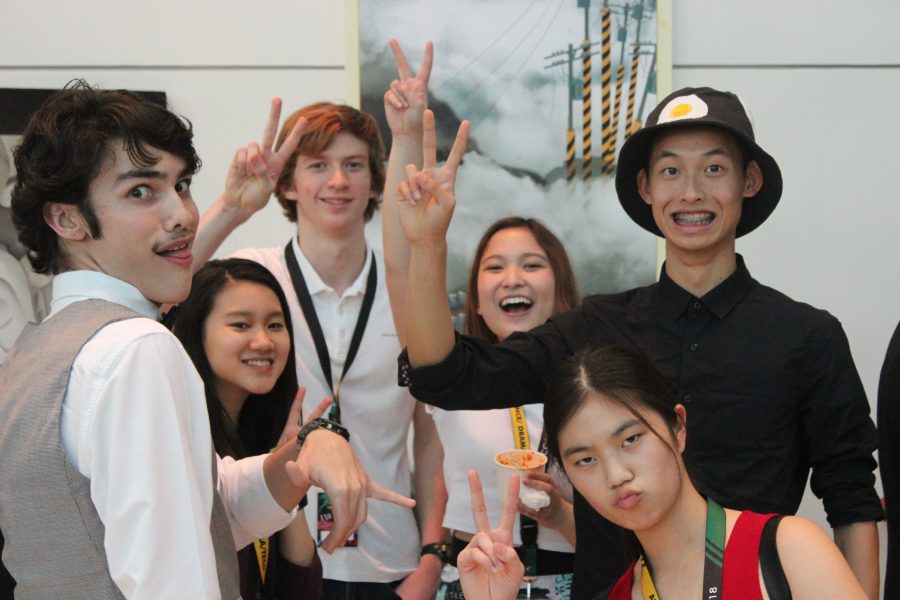Some call it “table-banging,” others know it as “IASAS Hugs” or “IASAS Crush.” Whatever the name, this long-held tradition at Interscholastic Association of Southeast Asian Schools sports tournaments features teams chanting an athlete’s name and pounding on tables, until that unfortunate soul succumbs and asks their IASAS crush for a hug. This rowdy spectacle dominates IASAS closing banquets—or at least it used to.
Earlier this month, however, IASAS Hugs were banned from IASAS second season tournaments. Some students view this move as an overreaction. Susanna Hyvonen, an athlete from the International School of Kuala Lumpur, says, “I personally think that the tradition was misunderstood by adults…it was an innocent act by the IASAS participants, and was never intended to be harmful in any way.”
Admittedly, from personal experience, IASAS Hugs can be incredibly fun. Teams from different schools have the opportunity to bond as they gleefully take on the role of matchmakers for their friends, and after a hug concludes, an uproarious cheer goes up from all in attendance.
Yet, beneath all the laughs, IASAS Hugs was a deeply flawed tradition. For one, it is a textbook example of peer pressure. Of course, male and female athletes can both be called up for this ritual. However, just for an example, visualize dozens of teenagers, all screaming for Bob Chen at the top of their lungs to get up and entertain them. Obviously, saying “no” is not a popular option. And if it is difficult for Bob to stand up against such pressure, it is
virtually impossible for the object of his affection to turn down the hug. The girl Bob picks may not want to hug him, or anyone else for that matter, but in IASAS Hugs, her consent rarely factored into the equation.
In short, the tradition also represented a form of physical harassment. These are serious accusations: Many would simply say that IASAS Hugs is not that big of a deal. For the most part, I agree. I believe that it had innocent intentions, and I have never heard any IASAS participant seriously complain about it. Nevertheless, innocent intentions do not guarantee innocent results. So if IASAS Hugs has ever caused anyone true distress or discomfort—as I suspect it has more than once—then it is time for it to go.
As Ms. Kim Kawamoto, Taipei American School Athletic Director, says, “It does not align with our values as a conference, and as a school.” We now enter a hug-less era of IASAS. It is, indisputably, a morally better era. And while we are sacrificing this one source of entertainment for our principles, Joshua Aho, an International School of Manila athlete, summed it up best when he said, “IASAS will still be IASAS without it. It’ll still be full of fun, excitement, and amazing memories.”


![A myriad of impressive trophies and awards. [ANNABELLE HSU/THE BLUE & GOLD]](https://blueandgoldonline.org/wp-content/uploads/2025/09/Awards2-1200x512.jpeg)
![Students' calendars say goodbye to exam week. [ANNABELLE HSU/THE BLUE & GOLD]](https://blueandgoldonline.org/wp-content/uploads/2025/09/Exam-week-1200x740.jpg)
![A collection of college flags. [PHOTO COURTESY OF AMBER HU ('27)]](https://blueandgoldonline.org/wp-content/uploads/2025/05/IMG_5029-1200x577.jpeg)

![An SAT word cloud. [PHOTO COURTESY OF WORDCLOUDS]](https://blueandgoldonline.org/wp-content/uploads/2025/05/SAT.jpeg)
![Collage of banned books, including “The Handmaid’s Tale” by Margaret Atwood. [MINSUN KIM/ THE BLUE & GOLD]](https://blueandgoldonline.org/wp-content/uploads/2025/04/IMG_4274-1200x681.jpeg)